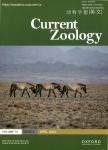Olfaction and reaction: The role of olfactory and hypothalamic investment in the antipredator responses to chemical alarm cues by northern redbelly dace
作者机构:Department of BiologyConcordia UniversityMontrealQuebecCanada
出 版 物:《Current Zoology》 (动物学报(英文版))
年 卷 期:2023年第69卷第6期
页 面:738-746页
核心收录:
学科分类:0710[理学-生物学] 07[理学] 071002[理学-动物学]
基 金:Natural Sciences and Engineering Research Council of Canada Discovery Grant (G.E.B.)
主 题:boldness brainmorphology neuroplasticity predation proactivity stress-coping style
摘 要:Neuroplasticity enables teleosts to promote or downregulate the growth of their brains *** compensate for the effects of predation pressure,teleosts may alter their brain morphology and behavioral responses to mitigate its impact on individual ***-predation environ-ments often promote specific patterns of brain growth and produce bolder and more proactive *** to the expense of maintaining neural tissue,relative size indicates the regions most relied *** northern redbelly dace Chrosomus eos,as little as 2 weeks of elevated predation pressure,resulted in increased investment in their olfactory bulbs and optic tecta,while the imposition of captivity produced smaller,less symmetric *** together,these results suggest that an individual could potentially become better able to detect a threat,and simultaneously less inclined to react to it,making the impact of either change in isolation is difficult to ***,we compared interindividual variation in gross brain morphology,risk-taking tactics in a novel arena(shy-bold personality),and responding to olfactory cues(proactive/reac-tive stress-coping style).We hypothesized that olfactory investment would positively correlate with response intensity to predator cue concen-tration and respond across a wider range of cue concentrations,while hypothalamus size would correlate with shyness and *** to heightened risk produced more bold/proactive individuals,with larger olfactory bulbs and smaller ***,the direction of the correlation between hypothalamus size and behavior varied by treatment,and olfactory investment only corresponded with response intensity amongst proactive *** findings illustrate the potential pitfalls of relating gross brain morphology to complex behavior and suggest that stress-coping style is a relevant consideration in future studies.



